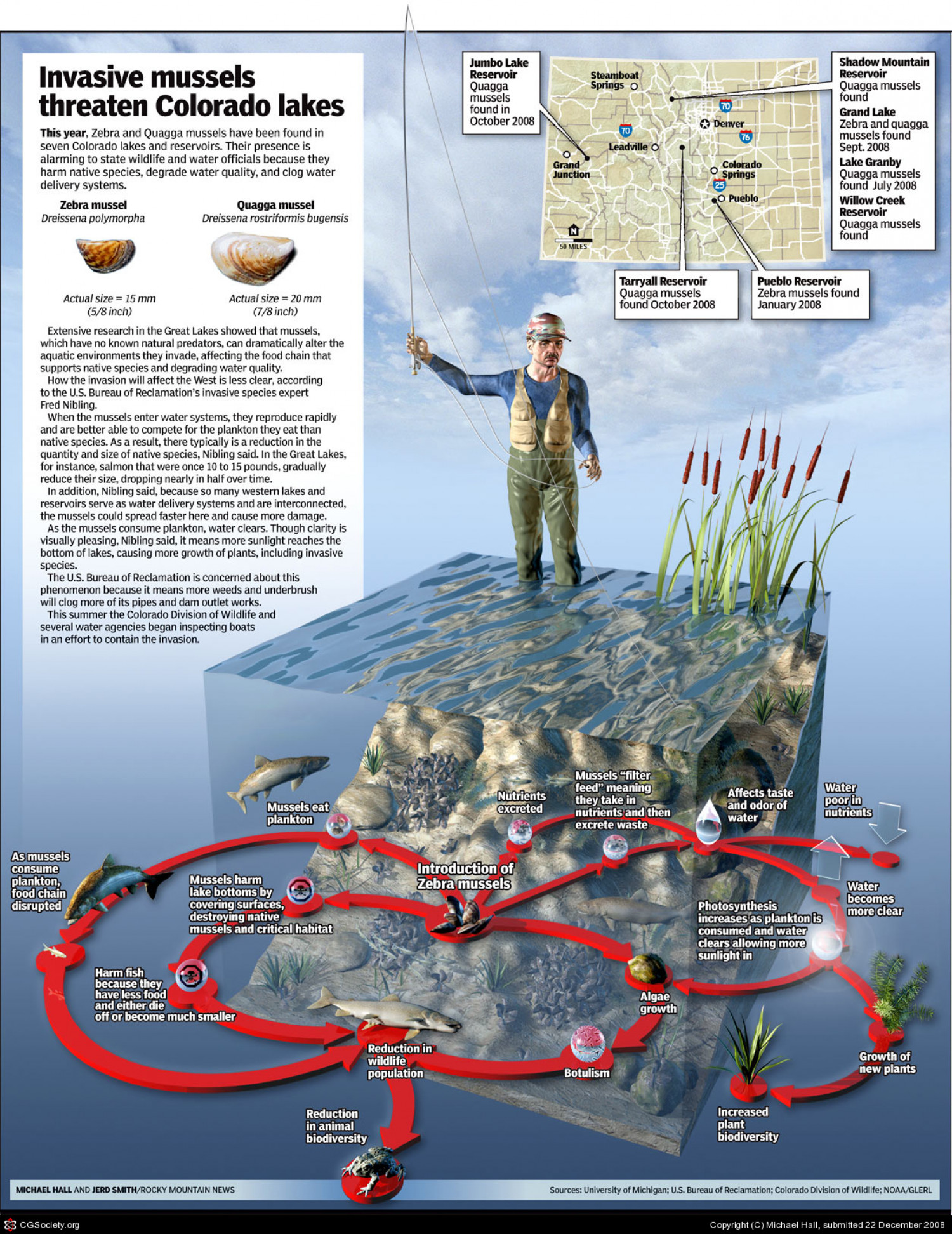
Invasive Mussels Threaten Colorado Lakes
Invasive mussels threaten Colorado lakes Jumbo Lake Reservoir Quagga mussels found in October 2008 Shadow Mountain Reservoir Quagga mussels found Steamboat Springs o 70 Grand Lake Zebra and quagga mussels found Sept. 2008 Lake Granby Quagga mussels found July 2008 O Denver 70 This year, Zebra and Quagga mussels have been found in seven Colorado lakes and reservoirs. Their presence is alarming to state wildlife and water officials because they harm native species, degrade water quality, and clog water delivery systems. Leadville O Grand Junction Colorado Springs O Pueblo Zebra mussel Dreissena polymorpha Quagga mussel Dreissena rostriformis bugensis Willow Creek Reservoir Quagga mussels found 50 MILES Tarryall Reservoir Quagga mussels found October 2008 Pueblo Reservoir Zebra mussels found January 2008 Actual size = 15 mm Actual size = 20 mm (5/8 inch) (7/8 inch) Extensive research in the Great Lakes showed that mussels, which have no known natural predators, can dramatically alter the aquatic environments they invade, affecting the food chain that supports native species and degrading water quality. How the invasion will affect the West is less clear, according to the U.S. Bureau of Reclamation's invasive species expert Fred Nibling. When the mussels enter water systems, they reproduce rapidly and are better able to compete for the plankton they eat than native species. As a result, there typically is a reduction in the antity and size of native species, Nibling said. In the Great Lakes, for instance, salmon that were once 10 to 15 pounds, gradually reduce their size, dropping nearly in half over tim In addition, Nibling said, because so many western lakes and reservoirs serve as water delivery systems and are interconnected, the mussels could spread faster here and cause more damage. As the mussels consume plankton, water clears. Though clarity is visually pleasing, Nibling said, it means more sunlight reaches the bottom of lakes, causing more growth of plants, including invasive species. The U.S. Bureau of Reclamation is concerned about this phenomenon because it means more weeds and underbrush will clog more of its pipes and dam outlet works. This summer the Colorado Division of Wildlife and several water agencies began inspecting boats in an effort to contain the invasion. time. Mussels "filter feed" meaning they take in nutrients and then excrete waste Water poor in nutrients Nutrients excreted Affects taste and odor of Mussels eat plankton water As mussels Introduction of Zebra mussels consume plankton, food chain disrupted Mussels harm lake bottoms by covering surfaces, destroying native mussels and critical habitat Photosynthesis increases as plankton is consumed and water clears allowing more sunlight in Water becomes more clear Harm fish because they have less food and either die off or become much smaller Algae growth Reduction in wildlife population Growth of new plants Botulism Reduction in animal biodiversity Increased plant biodiversity MICHAEL HALL AND JERD SMITH/ROCKY MOUNTAIN NEWS Sources: University of Michigan; U.S. Bureau of Reclamation; Colorado Division of Wildlife; NOAA/GLERL 3 CGSociety.org Copyright (C) Michael Hall, submitted 22 December 2008
Invasive Mussels Threaten Colorado Lakes
Publisher
Rocky Mountain NewsDesigner
Michael HallSource
Unknown. Add a sourceCategory
EnvironmentGet a Quote











